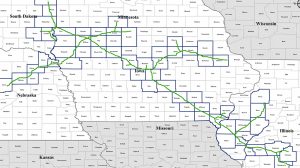CLICK HERE for the latest market quotes from the Iowa Agribusiness Network!
CLICK HERE for the latest market quotes from the Brownfield Ag News Network!
CLICK HERE for the latest market quotes from the Iowa Agribusiness Network!
CLICK HERE for the latest market quotes from the Brownfield Ag News Network!
DALLAS COUNTY, Iowa (KCCI) — Bicyclists and hikers will no longer need to purchase a permit to use the Raccoon River Valley Trail. The Dallas, Guthrie, and Greene County Conservation Boards hope this will encourage more people to use the trail that runs from Jefferson to Clive.
The permit requirement ends at the start of next year. A special trail event permit will still be required for large trail events.
(Iowa DNR News) – The Iowa Department of Natural Resources (DNR) reminds lake property owners to check their boat and trailers, and docks and lifts, for aquatic invasive species before storing them for the winter. Aquatic invasive species, everything from zebra mussels to Eurasian watermilfoil, move from one waterbody to another by hitchhiking on boats, in bait buckets and on other equipment used in the water. They can create serious problems for Iowa waters and negatively impact the quality of outdoor recreation experiences.
Kim Bogenschutz, aquatic invasive species coordinator for the Iowa DNR, says “Fall is a great time for lake property owners to check their boats, docks and lifts for new infestations of aquatic invasive species like zebra mussels. As you bring each item out of the water, visually inspect areas that have been submerged for months. Touch smooth surfaces to check for juvenile zebra mussels that feel like sandpaper when you run your hand over a surface they’ve attached themselves to and are often invisible to the human eye.”
Aquatic invasive species often grow quickly and spread fast when brought to a new lake or stream due to lack of natural controls.
How to Prevent the Spread of Invasive Species
Iowa law also requires boaters to drain all water from boats and equipment before they leave a water access and to keep drain plugs removed or opened during transport. It is also illegal to introduce any live fish, except for hooked bait, into public waters.
Learn more about aquatic invasive species, including a list of infested waters in the current Iowa Fishing Regulations or at www.iowadnr.gov/ais.

(Radio Iowa) – U-S Ag Secretary Tom Vilsack says if congress fails to at least extend the current Farm Bill by year’s end, key programs — including one for dairy farmers — expire.
The Dairy Margin Protection Program was created in the 2018 Farm Bill. It provides payments to farmers when the cost of the milk they sell falls below the cost of production. There are over 800 dairy farms operating in Iowa today. Vilsack says the likely scenario is that the House and Senate will eventually vote to keep the 2018 Farm Bill policies in place until a new Farm Bill is developed.
Vilsack says the big stumbling block in negotiations on the 2023 Farm Bill has been whether to raise what are called “reference prices” for corn, soybeans, wheat and cotton to account for rising production costs. Those reference prices are used to calculate federal crop subsidies. Vilsack says it would cost 20 BILLION dollars over the next decade if those reference prices for corn and other commodities are hiked in the next Farm Bill.
(Radio Iowa) – Iowa Ag Secretary Mike Naig says the fall migration of wild birds is a danger sign for poultry producers about the potential for Avian Influenza exposure. Naig says the first major outbreak in 2015 saw a lot of contamination between sites, but the most recent outbreak saw isolated exposures in facilities brought on by wild birds. “I think the lessons of the last couple of years would tell us that it’s not just during the spring migration, when birds are flying north that you can see high path, it’s unfortunately, also in that fall migration when birds are flying south that you can see it,” Naig says.
He says there are already confirmed cases in two states to the north of us. “In South Dakota and Minnesota, and that’s pretty logical as those birds start to come south we’re going to see an increased threat here in the state of Iowa, to our poultry producers,” Naig says. “And so it’s just a time of high alert. And folks really need to be vigilant in watching the health of their birds and calling us if they see anything or have questions.”
Naig says producers can’t take anything for granted when it comes to keeping down the contact with wild birds. “Trying to keep what’s outside, and what’s inside inside. You don’t want to track, you know what could be outside into those buildings. That means taking care of your boots, that means securing your buildings, you know, there’s any number of things that you can do, but it takes vigilance every single day,” he says.
The Avian Influenza or bird flu can have different strains, but Naig says he doesn’t know yet what the test results show from the early cases. “I have not seen the analysis yet on whether or not this is the same strain as we’ve seen in previous years. But I think we’ll all be watching very closely to understand that,” Naig says.
There were some 77 facilities impacted in the first major outbreak in 2015, with millions of birds destroyed. The most recent outbreak saw 32 facilities impacted.
(Radio Iowa) – A Mitchell man is dead after being trapped in a grain bin. The Mitchell County Sheriff’s Office says they received a 9-1-1 call shortly after noon on Wednesday about a grain bin entrapment near the intersection of State Highway 9 and Glass Avenue. First responders at the scene found 69-year-old Dennis Fischer trapped in the bin. Authorities say rescuers were not able to free Fischer from the bin for an extended period of time and Fischer was later pronounced dead at the scene.
The Mitchell County Sheriff’s Office is reminding producers as they continue with the harvest to be mindful of the dangers of entering a grain bin, operating equipment after long hours of work and the impatience of the motoring public on the roadways.
Des Moines, Iowa – Iowa Governor Kim Reynolds today (Wednesday), signed an extension of the proclamation relating to the weight limits and transportation of grain, fertilizer, and manure. The proclamation is effective immediately and continues through November 11, 2023. The proclamation allows vehicles transporting corn, soybeans, hay, straw, silage, stover, fertilizer (dry, liquid, and gas), and manure (dry and liquid) to be overweight (not exceeding 90,000 pounds gross weight) without a permit for the duration of this proclamation.
This proclamation applies to loads transported on all highways within Iowa (excluding the interstate system) and those which do not exceed a maximum of 90,000 pounds gross weight, do not exceed the maximum axle weight limit determined under the non-primary highway maximum gross weight table in Iowa Code § 321.463 (6) (a) and (b), by more than 12.5 percent, do not exceed the legal maximum axle weight limit of 20,000 pounds, and comply with posted limits on roads and bridges.
See the proclamation here.
(Omaha, NE via Iowa Capital Dispatch) – Officials with Navigator CO2, Tuesday moved to withdraw their carbon dioxide pipeline permit application in Illinois, effectively halting its project.The motion comes about a week before the Illinois Commerce Commission was set to hold an evidentiary hearing for the application. The company’s proposed 1,350-mile pipeline system suffered a setback in South Dakota in September when state regulators denied Navigator a construction permit. Later that month, the company asked to suspend its permit process in Iowa. At the time, Navigator indicated it would wait for a ruling on its permit in Illinois, which was expected by the end of February 2024.But the company now says it is “taking time to reassess the route and application.”
“Navigator will withdraw its current application with the intent to reinitiate Illinois permitting, if appropriate, when Navigator’s full evaluation is complete,” the company said in a prepared statement. A company spokesperson declined to comment further. Navigator had previously withdrawn its first application in Illinois and reapplied because of a route adjustment. Navigator proposes to transport captured carbon dioxide from ethanol plants and other facilities in five states to Illinois for underground sequestration and other commercial uses. Most of those sites are in Iowa. Opponents of the project say it poses a safety risk to residents and livestock, it would irreparably damage farmland, and that the use of eminent domain to build it is improper because it doesn’t serve the public.
The proposal is one of three in Iowa. Summit Carbon Solutions is near the end of its permit process with the Iowa Utilities Board. An evidentiary hearing is pending and expected to resume for days in November. The company hopes to have a decision on its Iowa permit by the end of the year. Summit was also denied a permit in South Dakota but plans to reapply. North Dakota utility regulators also denied Summit a permit but have agreed to reconsider the application. The Summit pipeline would carry carbon dioxide emissions from more than 30 ethanol plants in Iowa, Minnesota, Nebraska, North Dakota and South Dakota. The emissions would be buried in North Dakota.
Wolf Carbon Solutions wants to build a much smaller system in eastern Iowa, but the IUB has not yet set a procedural schedule to guide the rest of its permit process.

Navigator CO2 Ventures seeks to build about 1,350 miles of carbon dioxide pipeline in five states. (Map courtesy of Navigator CO2 Ventures)